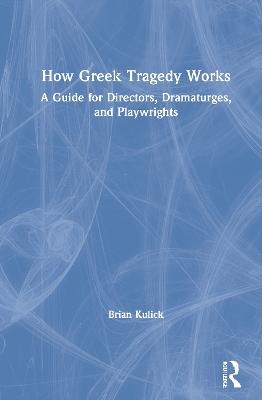
How Greek Tragedy Works
Routledge (Verlag)
978-0-367-63407-0 (ISBN)
Brian Kulick dispels the trepidation that many readers feel with regard to classical texts by equipping them with ways in which they can unpack the hidden meanings of these plays. He focuses on three of the key texts of Greek theatre: Aeschylus' Agamemnon, Euripides' The Bacchae, and Sophocles' Electra, and uses them to tease out the core principles of the theatre-making and storytelling impulses. By encouraging us to read between the lines like this, he also enables us to read these and other Greek tragedies as artists' manifestos, equipping us not only to understand tragedy itself, but also to interpret what the great playwrights had to say about the nature of plays and drama.
This is an indispensable guide for anyone who finds themselves confronted with tackling the Greek classics, whether as a reader, scholar, student, or director.
Brian Kulick is chair of the Theatre Program at Columbia University’s School of the Arts. He has been an Associate Artist at The Public Theatre where his work on Shakespeare has been seen at The Delacorte in Central Park, and the Artistic Director of Classic Stage Company where he directed such world premieres as Anne Carson’s critically acclaimed An Oresteia. .
Introduction: 115th and Broadway, circa 410 BCE; PART I: CONVERSING WITH SHADOWS; ON THE INTERPRETATION OF ANCIENT TEXTS; 1. Raising the dead; or, theatre as thanatology; 2. Antigone. A journey to the underworld of the text: how to read a Greek tragedy; 3. Dictionary for the ghost language of the tragic; PART II: TOWARD AN ALTERNATE POETICS; OR, WHAT OUR THREE GREEK TRAGEDIANS CAN TELL US ABOUT THE NATURE AND FUNCTION OF THE TRAGIC; 4. Aeschylus’s Agamemnon; or, first principles; 5. Sophocles’ Electra; or, the dialectics of the tragic; 6. Euripides’ The Bacchae; or, recognition as re-cognition; PART III: FURTHER THOUGHTS ON FORM; 7. Tragedy as "the metaphor of an intellectual intuition;" Hölderlin on the poetics of the tragic; 8. Among the ruins: what the fragments can tell us about Greek tragedy; CODA: BACK TO THE LIGHT OF DAY; Appendices
| Erscheinungsdatum | 15.01.2021 |
|---|---|
| Verlagsort | London |
| Sprache | englisch |
| Maße | 156 x 234 mm |
| Gewicht | 453 g |
| Themenwelt | Kunst / Musik / Theater ► Theater / Ballett |
| Geschichte ► Allgemeine Geschichte ► Vor- und Frühgeschichte | |
| Geschichte ► Allgemeine Geschichte ► Altertum / Antike | |
| Geisteswissenschaften ► Sprach- / Literaturwissenschaft ► Anglistik / Amerikanistik | |
| Geisteswissenschaften ► Sprach- / Literaturwissenschaft ► Literaturwissenschaft | |
| ISBN-10 | 0-367-63407-4 / 0367634074 |
| ISBN-13 | 978-0-367-63407-0 / 9780367634070 |
| Zustand | Neuware |
| Haben Sie eine Frage zum Produkt? |
aus dem Bereich


